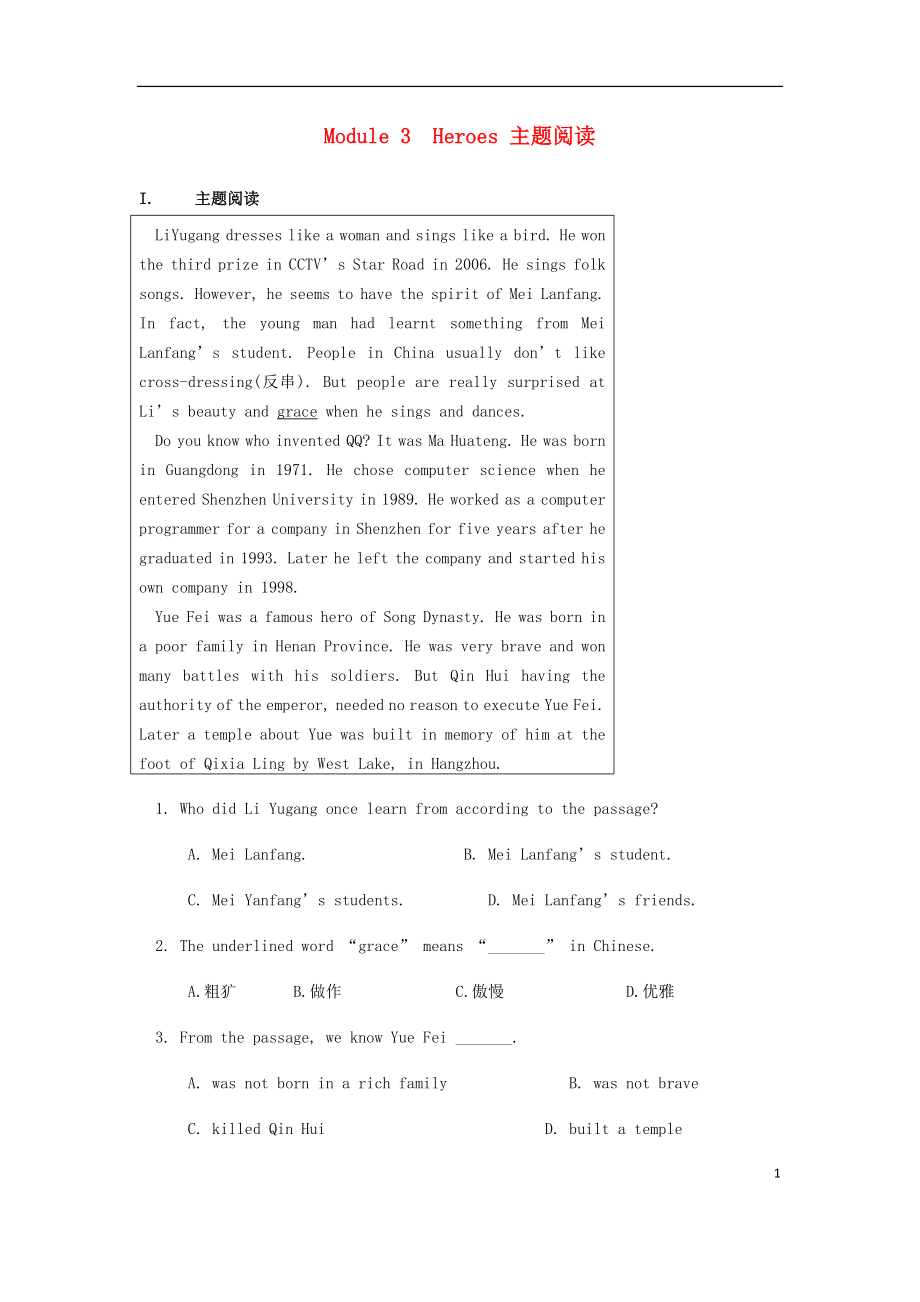《廣西2018年秋九年級(jí)英語上冊 Module 3 Heroes主題閱讀練習(xí)(無答案)(新版)外研版》由會(huì)員分享����,可在線閱讀,更多相關(guān)《廣西2018年秋九年級(jí)英語上冊 Module 3 Heroes主題閱讀練習(xí)(無答案)(新版)外研版(3頁珍藏版)》請?jiān)谘b配圖網(wǎng)上搜索�����。
1����、
Module 3 Heroes 主題閱讀
I. 主題閱讀
LiYugang dresses like a woman and sings like a bird. He won the third prize in CCTV’s Star Road in 2006. He sings folk songs. However, he seems to have the spirit of Mei Lanfang. In fact, the young man had learnt something from Mei Lanfang’s student. People in China
2���、 usually don’t like cross-dressing(反串). But people are really surprised at Li’s beauty and grace when he sings and dances.
Do you know who invented QQ? It was Ma Huateng. He was born in Guangdong in 1971. He chose computer science when he entered Shenzhen University in 1989. He worked as a computer
3、 programmer for a company in Shenzhen for five years after he graduated in 1993. Later he left the company and started his own company in 1998.
Yue Fei was a famous hero of Song Dynasty. He was born in a poor family in Henan Province. He was very brave and won many battles with his soldiers. But Qi
4����、n Hui having the authority of the emperor, needed no reason to execute Yue Fei. Later a temple about Yue was built in memory of him at the foot of Qixia Ling by West Lake, in Hangzhou.
1. Who did Li Yugang once learn from according to the passage?
A. Mei Lanfang. B. Mei Lanfa
5、ng’s student.
C. Mei Yanfang’s students. D. Mei Lanfang’s friends.
2. The underlined word “grace” means “_______” in Chinese.
A.粗獷 B.做作 C.傲慢 D.優(yōu)雅
3. From the passage, we know Yue Fei _______.
A. was not born in a rich family
6���、B. was not brave
C. killed Qin Hui D. built a temple
4. Ma Huateng set up his own company when he was ________.
A. 18 B. 22 . C. 27 D. 42
5. Which of the following is TRUE?
A. Li Yugang invented QQ.
B. Ma Huateng used to wor
7、k as a computer programmer for a company.
C. Li Yugang won the first prize in CCTV’s Star Road.
D. Yue Fei seldom won battles with his soldiers.
II. 完形填空
Lang Lang is a world-class young pianist who grew up in Shenyang. He went to a piano school in Beijing when he was just eight. “You need fort
8����、une (運(yùn)氣),” his father said. “But 1 you work hard, no fortune will come.”
What made him sad was that his piano teacher in Beijing didn’t like him. “You have no 2 . You will never be a pianist.” As an eight-year-old boy, Lang Lang was badly 3 . He decided that he didn’t want to be a pianis
9、t any more. For the next two weeks he didn’t touch the piano. Wisely (明智地) his father didn’t ___4___ , but wait.
Luckily, the day came when his teacher asked him to play some holiday songs. He didn’t want to, but as he placed his fingers on the piano keys, he 5 he could show other people that h
10���、e had the ability to do it well. That day he told his father that he wanted to 6 with a new teacher. From that point on, everything turned around.
He started 7 competitions. In the 1994 International Young Pianists Competition when it was announced that Lang Lang had won, he was too 8
11����、to hold back his tears. Soon it was clear that he couldn’t stay in China forever—he had to play on the world’s big stages. In 1997 Lang Lang 9 again, this time to Philadelphia, USA.
There he spent two years practicing and by 1999 he had worked hard enough for fortune to take over. After his 1
12����、0 performance at Chicago’s Raviniu Festival, gigs(演奏會(huì)) in Lincoln Center and Carnegie Hall started pouring in. Lang Lang finally worked to reach the place where fortune spots (找到) him, and lets him shine.
1. A. if B. unless C. when D. since
2. A. piano B. knowledge C. fortune D. talent
3.
13、A. hurt B. ill C. broken D. scared
4. A. hear B. push C. eat D. sleep
5. A. realized B. explained C. forgot D. noticed
6. A. argue B. dance C. study D. interview
7. A. winning B. beating C. watching D. refusing
8. A. annoyed B. mad C. tired D. excited
9. A. started B. left C. moved D. performed
10. A. helpful B. meaningful C. successful D. useful
3
 廣西2018年秋九年級(jí)英語上冊 Module 3 Heroes主題閱讀練習(xí)(無答案)(新版)外研版
廣西2018年秋九年級(jí)英語上冊 Module 3 Heroes主題閱讀練習(xí)(無答案)(新版)外研版

